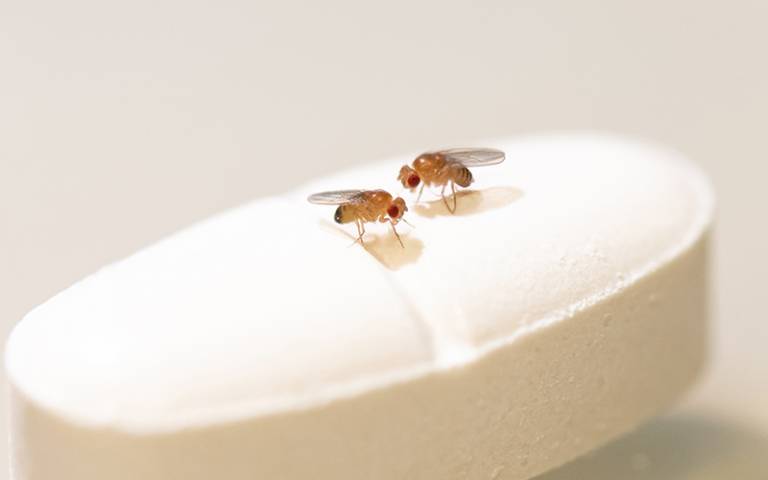Anti-ageing drug rapamycin might only benefit females
1 December 2022
The anti-ageing drug rapamycin only prolongs the lifespan of female fruit flies, but not that of males, finds a new study co-led by UCL researchers.

Working with researchers from the Max Planck Institute for Biology of Ageing in Cologne, the team reports in Nature Aging that in addition, rapamycin only slowed the development of age-related pathological changes in the gut in female flies.
The researchers conclude that the biological sex is a crucial factor in the effectiveness of anti-ageing drugs.
In humans, the life expectancy of women is significantly higher than that of men. However, women also suffer more often from age-related diseases and adverse drug reactions.
Co-lead author Dr Yu-Xuan Lu (Max Planck Institute for Biology of Ageing) said: “Our long-term goal is to make men live as long as women and also women as healthy as men in late life. But for that, we need to understand where the differences come from.”
The researchers gave the anti-ageing drug rapamycin to male and female fruit flies to study the effect on the different sexes. Rapamycin is a cell growth inhibitor and immune regulator that is normally used in cancer therapy and after organ transplantations. They found that rapamycin extended the lifespan and slowed age-related intestinal pathologies in female flies but not in males.
The researchers observed that rapamycin increased autophagy - the cell’s waste disposal process - in the female intestinal cells. Male intestinal cells, however, already seem to have a high basal autophagy activity, which cannot be further increased by rapamycin. The scientists could also see this effect of rapamycin in mice. Female mice showed increased autophagy activity after treatment with rapamycin.
Dr Lu, who shared first authorship of the study with Dr Jennifer Regan (UCL Institute of Healthy Ageing, UCL Biosciences, and University of Edinburgh), said: “Previous studies found that females had greater responses to rapamycin on lifespan extension than did males in mice; we now uncover an underlying mechanism of these differences using flies.”
Senior author Professor Dame Linda Partridge (UCL Institute of Healthy Ageing, UCL Biosciences, and Max Planck Institute for Biology of Ageing) said: “Sex can be a decisive factor for the effectiveness of anti-ageing drugs. Understanding the processes that are sex-specific and determine response to therapeutics will improve the development of personalised treatments.”
The study was funded by the CECAD Cluster of Excellence for Aging Research.
Research at the UCL Institute of Healthy Ageing seeks to discover the biological mechanisms of ageing in order to understand causes of age-related diseases and improve human health at older ages, with recent studies identifying genes linked to longer human lifespan, and extending fruit fly lifespan by 48% with a combination drug treatment.*
Links
- * UCL News, 2022: Genes newly linked to longer human lifespan, UCL News, 2019: Fruit flies live longer with combination drug treatment
- Research paper in Nature Aging
- Professor Dame Linda Partridge’s academic profile
- UCL Institute of Healthy Ageing
- UCL Biosciences
Credit
Image
- Copyright : K.Link / Max Planck Institute for Biology of Ageing, 2022
Media contact
Chris Lane
Tel: +44 (0)20 7679 9222
Email: chris.lane [at] ucl.ac.uk
 Close
Close

